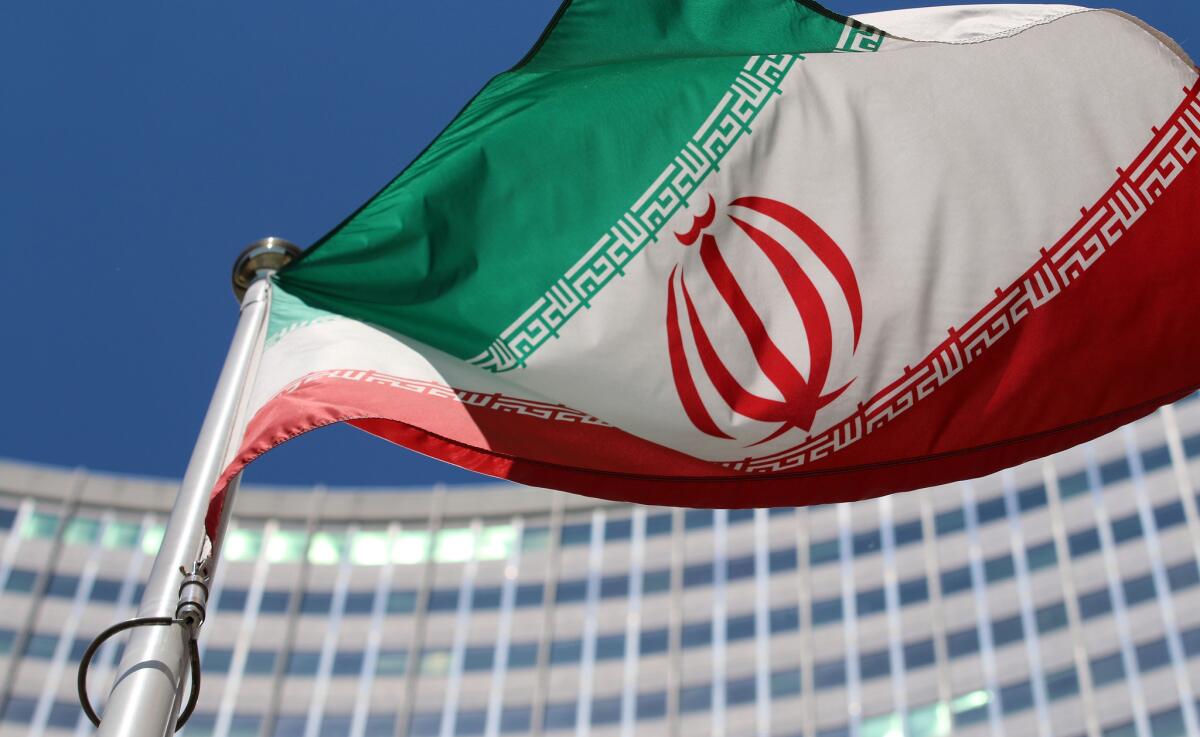Iran eases key demand in nuclear talks, boosting chances for a deal

- Share via
Reporting from Vienna — Iran is easing a key demand in negotiations with world powers over its disputed nuclear program, boosting prospects for the top-priority agreement that diplomats are racing to finish within a month.
Abbas Araqchi, Iran’s deputy foreign minister, acknowledged amid a week of negotiations in Vienna that Tehran now accepts the principle that as part of the deal sanctions on its economy would be gradually eased as Iran gradually complies with limits on its nuclear activities.
Iran’s official line has been that it would require an immediate lifting of all of the sanctions at the time the deal is signed. The economic penalties have choked off its oil exports and limited its trade, and the Iranian government needs to have them lifted as soon as possible to help restore its teetering economy.
“It’s a big deal,” said Cliff Kupchan, an Iran specialist at the Eurasia Group risk consulting firm. “Iran is recognizing that lifting sanctions will be tough and take time here. Araqchi’s statement lifts one barrier, a significant one, to a deal.”
Iranian and Western officials continue to stress that many differences remain between the two sides, led by disagreements over how much sensitive nuclear equipment Iran could retain under the deal.
Yet the two sides appear to have resolved several issues that at one time looked like deal-breakers.
They have apparently agreed that the Arak heavy-water nuclear reactor will be modified in a way that will limit its production of plutonium, a potential nuclear bomb fuel.
They appear to be closing in on a compromise under which Iran would transform a bomb-resistant underground uranium enrichment facility at Fordo into a research center acceptable to the West.
Both the Iranians and the Obama administration are under powerful political pressure not to accept a deal that gives away too much.
But they both badly need an agreement. President Obama wants to defuse pressure to consider a military strike on Iran, and the Iranian administration could lose all influence if it fails to deliver the sanctions relief Iranians are demanding.
The phased elimination of sanctions is complex because of legal, technical and political issues. Diplomats have conferred with technical experts on it in this week’s sixth negotiating session, which began Monday and is expected to adjourn Friday.
One of the key issues is how to win the cooperation of Congress in lifting the sanctions. Congress has resisted eliminating sanctions of any kind, and many lawmakers are deeply suspicious that the Obama administration’s deal could be too lenient.
But the administration might overcome this challenge by initially lifting some of the sanctions by executive action, and later urging Congress to do its part once Iran has established a record of cooperation with the deal, said Ray Takeyh, an Iran specialist at the Council on Foreign Relations.
“Their argument would be to the Hill that you don’t want to disrupt a successful arms control agreement,” said Takeyh. “The administration has probably assured [Iran] that this is the most plausible way of getting congressional assent” for sanctions relief.
Araqchi’s comments were made to a group of Iranian journalists late Tuesday night.
The two sides appeared to reach an impasse in a meeting in Vienna last month, which ended with U.S. and Iranian officials warning each other that they needed to make major compromises to keep the talks alive.
Araqchi told the journalists that he expected the two sides to begin on Wednesday assembling the text of a deal, which he said could probably still have a hundred disputed points.
Nevertheless, the Iranian team has been notably optimistic at the meeting, saying they still hope to reach an agreement by the July 20 deadline. At the same time, they have acknowledged that may not be possible.
The diplomats are saying they may schedule their next meeting in early July and might even stay at the bargaining table for three weeks straight to complete the deal.
Deputy Secretary of State William J. Burns, who took part in a meeting with the Iranians and European Union officials Monday, has left Vienna. He discussed the nuclear negotiations, and also spoke to the Iranians on the sidelines of the meeting about cooperation on the crisis in Iraq, which threatens the U.S.- and Iranian-backed central government.
In his comments, Araqchi said that if the countries need to seek an extension of the negotiating deadline beyond July 20, it would create problems for the Obama administration. Though he didn’t explain why, he presumably meant because U.S. lawmakers could try to block further talks.
Takeyh, of the Council on Foreign Relations, said Araqchi may be expressing optimism because he believes the U.S. needs to complete the deal within a month and for Tehran’s help on Iraq gives Iran extra leverage.
Araqchi insisted that there were no “negotiations” between Burns and the Iranians over U.S.-Iranian military cooperation in Iraq. But he said it was only natural that officials would discuss a crisis that has stirred wide concern in the region.
Follow @richtpau for news of Iran and U.S. foreign policy
More to Read
Sign up for Essential California
The most important California stories and recommendations in your inbox every morning.
You may occasionally receive promotional content from the Los Angeles Times.














